Catalogue > List by artist
Browse the entire list of Rencontre Internationales artists since 2004. Use the alphabetical filter to refine your search. update in progress
Gil & Moti, Gil & Moti
Catalogue : 2010Nasser | Video | dv | color | 7:8 | Netherlands, Israel | 2009
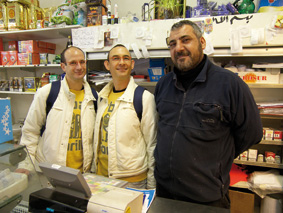
Gil & Moti
Nasser
Video | dv | color | 7:8 | Netherlands, Israel | 2009
Gil & Moti / `Nasser` / 2008-2009 / 7`:08`` In 2008 the Israeli?Dutch artist duo Gil & Moti started their project Available for You. They offered their services free of charge to immigrants from Arab countries in Copenhagen and Rotterdam and documented their encounters in diary entries, photos and videos. Gil & Moti bridge the barriers of miscom-munication in an intelligent manner. At the same time, they raise themes from an artistic perspective that apply globally: themes such as sociability, integration and exclusion. On the border of the public and private domain and of the art institution and the street, they have created their project as a fascinating vision of an artistic and humanitarian practice in a changing world beset by conflict.
We Gil & Moti, are duo artists living and working together since 1994. Our work moves freely between life, the visual arts and performance. The decision to live life as a performance and to make art a way of living creates a tension, which motivates the work and is presented in the form of: installation, video, painting, writing and performance. With our work we engage in the appropriation of public space and its effect on human relationships. Our projects involve the rehabilitation of the network of associations in a given community. An analytic critique of the relationship of private life and public space constitutes an important facet of our practice. Jewish Israelis by birth, gay and immigrants in Holland we contribute with our work to the contemporary debates about being different and the rules of social coexistence. We express these concerns with vulnerable poetic narratives, suspended between reality and fantasy visualized in a range of images from mundane to highly theatrical.
Catalogue : 2009Fiddler on the Roof | Video | dv | color | 2:30 | Netherlands | 2008
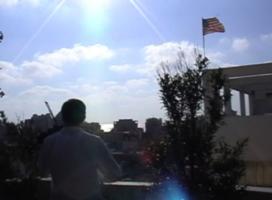
Gil & Moti, Gil & Moti
Fiddler on the Roof
Video | dv | color | 2:30 | Netherlands | 2008
During a sunny afternoon, while overlooking Tel Aviv skyline, a violist plays expressively a hybrid reconstructed composition of both the Israeli and Palestinian anthems. The hours of hard work practicing as well as the mental pain leave its remark on the violists? neck, as shown at the very last scene of the video. This wound is a metaphor to the long-term painful struggle of the two peoples and cultures. Taking as a point of departure their own nationality and the current situation in Israel, concepts such as humanity, atonement and forgiveness acquire an added significance, and these are the very themes, which recur in the duo?s artistic work. In this video the artists suggest a utopian wish to have the two enemies living peacefully side-by-side.
Gil & Moti Gil Nader, b. Rishon LeZion, 1968. Moti Porat, b. Ganey Yehuda, 1971. They live and work together as the duo: Gil & Moti, since 1994 and are based in Rotterdam, Holland since 1998. They are graduates of Bezalel Academy of Art and Design, Jerusalem (1990-1997, cum laude); MFA at Piet Zwart Institute, Rotterdam and Plymouth University, UK (1998-2000, cum laude). Further studies at The Slade School of Art, London (1994) and the School of Visual Art, New York (1996). Selected solo exhibitions include "Laylah the Creature Beyond Dreams" at Kunsthalle Wien, Vienna (2004); "Sleeping With the Enemy" at Jack the Pelican Presents, New York (2005); "Love Grows Free" at Eric Dupont Gallery, Paris (2006); "Dating Gil & Moti" at Mucsarnok Kunsthalle , Budapest (2006); " "Available for You" at Kunsthallen Nikolaj, Copenhagen (2008); "We Hope You Like it the way we Do" at Kulturhuset, Stockholm (2008). The Israeli and Dutch governments have supported their projects and their works are included in private and public collections such as: Tel-Aviv Museum of Art, Haifa Museum of Art, Mumok, Vienna. In 2008 they received 2 years living grant from The Netherlands Foundation for Visual Arts, Design and Architecture.
Wojciech Gilewicz
Catalogue : 2011Intrude | Art vidéo | dv | color | 6:5 | Poland, China | 2008
Wojciech Gilewicz, -
Intrude
Art vidéo | dv | color | 6:5 | Poland, China | 2008
When I was invited to China at the end of 2008, in my contract with Zendai MoMA in Shanghai, I was bounded to realize 6 to 8 oil paintings there. While painting, I am often using my video camera as well, which is kind of registering in a cold eye the process of the ?emergence? of my urban-based paintings. I did so also when working for the museum on this series of paintings. However, in this very project the camera is slightly drifting away from the actual paintings and is showing fragments of reality as if they were autonomous paintings themselves. The reality appears in this video quite neurotic and nervous as well as a bit hectic. It is mysterious, very much fragmented and somehow jagged. The paintings coming off the reality leave a strange tear to it or maybe rather quite a philosophic dilemma.
Wojciech Gilewicz (1974) Polish American painter, photographer, author of installations and videos. In his works, which usually combine all these disciplines, Gilewicz explores the phenomenon of illusion and the blurring of distinctions between reality and its artistic representation. He also shows how relative and changeable our perception of the surrounding world is. Gilewicz?s practice invites a reflexion on the mechanisms governing our perception and on the cultural determinants of the way we see things. www.gilewicz.net
Catalogue : 2010In Practice | Video | dv | color | 3:15 | Poland, USA | 2009
Wojciech Gilewicz
In Practice
Video | dv | color | 3:15 | Poland, USA | 2009
Wojciech Gilewicz: In Practice, 2009 (video) A series of oil paintings were installed outside the SculptureCenter building. The surfaces and forms of the canvases were designed to make them appear completely invisible while they were on site. A video documentating the process of placing the works in their environment encouraged visitors to explore the periphery of the building. Using a map I prepared, visitors were invited to search for the hidden paintings in the surrounding city space. I was primarily interested in challenging visitors` perception of space, reality and their surroundings. (by Wojciech Gilewicz) -------------- fragment of InPractice review by Lori Cole (ArtForum, 02.15.2009) "(...)While artists such as Peter Simensky, Carey Ascenzo, and Amy Patton struggle to reinvent site specificity, Wojciech Gilewicz defies its logic entirely in his deadpan installations-painted imitations of everyday surfaces, intended to go unnoticed in public space. In the video documentation of his project, Gilewicz nonchalantly installs the work in broad daylight, thereby performing the slight visual shifts between the trash on the surface of a garbage can and its painted replica, between a construction panel and its crafted double, and drawing attention to the way art can undermine even its own subversive rhetoric to make site both more and less noticeable." http://www.sculpture-center.org/pressSpecific.htm?id=61697
CV (narrative) Wojciech Gilewicz (1974) Polish American painter, photographer, author of installations and videos graduated from Academy of Fine Arts in Warsaw, Poland (1999) obtaining a Master?s Degree in Painting (Minor in Photography). In his works, which usually combine all these disciplines, Gilewicz explores the phenomenon of illusion and the blurring of distinctions between reality and its artistic representation. He shows also how relative and changeable our perception of the surrounding world is. Gilewicz?s practice invites a reflexion on the mechanisms governing our perception and on the cultural determinants of the way we see things. Selected soloexhibitions: Foksal Gallery Warsaw, Poland (2009); Contemporary Art Museum Saint Louis (2008); Museum of Fine Arts Ivano-Frankivsk, Ukraine (2007); Foksal Gallery Warsaw, Poland (2005), Fondation Deutsch de la Meurthe Paris, France (2004), CCA Ujazdowski Castle Warsaw, Poland (2001) Selected groupshows: MoCA Belgrade, Serbia (2009); MoBY Bat Yam, Israel (2009); CoCA, Torun, Poland (2009); Zendai MoMA Shanghai, China (2009); SculptureCenter New York (2009); Pianissimo Milan, Italy (2008); Museum of Art Lodz, Poland (2007); Zacheta National Gallery of Art Warsaw, Poland (2007) Selected artisticresidencies: TAV Taipei, Taiwan (2009); Zendai MoMA Shanghai, China (2008); ISCP New York (2008); Galichnik Macedonia (2005); Fundation Deutsch de la Meurthe Paris, France (2004) --------------- CV (detailed) Wojciech Gilewicz (www.gilewicz.net) EDUCATION 1999 Master?s Degree in Painting, Minor in Photography 1996 - 1999 Academy of Fine Arts Painting Department Warsaw, Poland 1994 - 1996 Academy of Fine Arts Painting Department Poznan, Poland SOLO EXHIBITIONS (selected) 2009 Lubelskie Towarzystwo Zachety Sztuk Pieknych, Lublin, Poland 2009 Foksal Gallery, Warsaw, Poland 2008 Contemporary Art Museum Saint Louis, USA 2007 Biala Gallery, Lublin, Poland 2007 Museum of Fine Arts, Iwano-Frankiwsk, Ukraine 2007 BWA Gallery Revitalisations, Sanok, Poland 2006 / 2007 Entropia Gallery The Aporia of Painting, Wroclaw, Poland 2005 TR Warszawa, Warsaw, Poland 2005 Foksal Gallery, Warsaw, Poland 2005 WAA (Warsaw Artists? Action) Them, Warsaw, Poland 2004 Fondation Deutsch de la Meurthe, Paris, France 2002 Arsenal Gallery, Bialystok, Poland 2001 Centre for Contemporary Art Ujazdowski Castle / Laboratorium Gallery City ? Estate ? Studio ? Apartment, Warsaw, Poland 2000 Biala Gallery Lublin, Poland 1999 Academy of Fine Arts, Warsaw, Poland GROUP EXHIBITIONS (selected) 2009 castillo/corrales Hello Goodbye Thank You Again, Paris, France 2009 Museum of Contemporary Art BELGRADE: NONPLACES. Art in public space, Belgrade, Serbia 2009 Aspen Art Museum Monitaur, Aspen, USA 2009 MoBY (Museum of Bat Yam) Factory, Bat Yam, Israel 2009 Centre of Contemporary Art Znaki Czasu Lucim żyje, Torun, Poland 2009 Zendai Museum of Modern Art Starting Point: Intrude Art & Life 366, Shanghai, China 2009 SculptureCenter In Practice, New York, USA 2008 Istituto Polacco di Roma Transfert Gallerie Polacche a Roma #6, Roma, Italy 2008 BWA Gallery External artists. OUT OF STH, Wroclaw, Poland 2008 Biala Gallery Remont generalny, Lublin, Poland 2008 White Box Gallery DiVA (Digital & Video Art), New York, USA 2008 Pianissimo Distortion of an Unendurable Reality, Milan, Italy 2008 Istituto Polacco di Roma Transfert Gallerie Polacche a Roma #2, Roma, Italy 2007 appendix2 Artyści polecają się nawzajem, Warsaw, Poland 2007 Museum of Art in Lodz Multi-way Street annex to the exhibition Beautiful Losers, Lodz, Poland 2007 Paul Robeson Galery Imago: The Drama of Self-Portraiture In Recent Photography, Newark, USA 2007 Zacheta National Gallery of Art / Kordegarda Gallery Here a Change Occurs, Warsaw, Poland 2006 Real Art Ways POZA, Hartford, USA 2006 Centre for Contemporary Art Laznia Love and Democracy, Gdansk, Poland 2006 LiveBox at Ravenswood, Chicago, USA 2006 Zacheta National Gallery of Art On Their Own, Warsaw, Poland 2003 National Museum / Krolikarnia, Warsaw, Poland 2002 Bunkier Sztuki, ZPAP Festival of Young Art novart.pl, Cracow, Poland 2001 BWA Galery Goscinna Pracownia Malarstwa Leona Tarasewicza goscinnie w Galerii BWA w Zielonej Gorze, Zielona Gora, Poland
Wojciech Gilewicz, -
Catalogue : 2011Intrude | Art vidéo | dv | color | 6:5 | Poland, China | 2008
Wojciech Gilewicz, -
Intrude
Art vidéo | dv | color | 6:5 | Poland, China | 2008
When I was invited to China at the end of 2008, in my contract with Zendai MoMA in Shanghai, I was bounded to realize 6 to 8 oil paintings there. While painting, I am often using my video camera as well, which is kind of registering in a cold eye the process of the ?emergence? of my urban-based paintings. I did so also when working for the museum on this series of paintings. However, in this very project the camera is slightly drifting away from the actual paintings and is showing fragments of reality as if they were autonomous paintings themselves. The reality appears in this video quite neurotic and nervous as well as a bit hectic. It is mysterious, very much fragmented and somehow jagged. The paintings coming off the reality leave a strange tear to it or maybe rather quite a philosophic dilemma.
Wojciech Gilewicz (1974) Polish American painter, photographer, author of installations and videos. In his works, which usually combine all these disciplines, Gilewicz explores the phenomenon of illusion and the blurring of distinctions between reality and its artistic representation. He also shows how relative and changeable our perception of the surrounding world is. Gilewicz?s practice invites a reflexion on the mechanisms governing our perception and on the cultural determinants of the way we see things. www.gilewicz.net
Catalogue : 2010In Practice | Video | dv | color | 3:15 | Poland, USA | 2009
Wojciech Gilewicz
In Practice
Video | dv | color | 3:15 | Poland, USA | 2009
Wojciech Gilewicz: In Practice, 2009 (video) A series of oil paintings were installed outside the SculptureCenter building. The surfaces and forms of the canvases were designed to make them appear completely invisible while they were on site. A video documentating the process of placing the works in their environment encouraged visitors to explore the periphery of the building. Using a map I prepared, visitors were invited to search for the hidden paintings in the surrounding city space. I was primarily interested in challenging visitors` perception of space, reality and their surroundings. (by Wojciech Gilewicz) -------------- fragment of InPractice review by Lori Cole (ArtForum, 02.15.2009) "(...)While artists such as Peter Simensky, Carey Ascenzo, and Amy Patton struggle to reinvent site specificity, Wojciech Gilewicz defies its logic entirely in his deadpan installations-painted imitations of everyday surfaces, intended to go unnoticed in public space. In the video documentation of his project, Gilewicz nonchalantly installs the work in broad daylight, thereby performing the slight visual shifts between the trash on the surface of a garbage can and its painted replica, between a construction panel and its crafted double, and drawing attention to the way art can undermine even its own subversive rhetoric to make site both more and less noticeable." http://www.sculpture-center.org/pressSpecific.htm?id=61697
CV (narrative) Wojciech Gilewicz (1974) Polish American painter, photographer, author of installations and videos graduated from Academy of Fine Arts in Warsaw, Poland (1999) obtaining a Master?s Degree in Painting (Minor in Photography). In his works, which usually combine all these disciplines, Gilewicz explores the phenomenon of illusion and the blurring of distinctions between reality and its artistic representation. He shows also how relative and changeable our perception of the surrounding world is. Gilewicz?s practice invites a reflexion on the mechanisms governing our perception and on the cultural determinants of the way we see things. Selected soloexhibitions: Foksal Gallery Warsaw, Poland (2009); Contemporary Art Museum Saint Louis (2008); Museum of Fine Arts Ivano-Frankivsk, Ukraine (2007); Foksal Gallery Warsaw, Poland (2005), Fondation Deutsch de la Meurthe Paris, France (2004), CCA Ujazdowski Castle Warsaw, Poland (2001) Selected groupshows: MoCA Belgrade, Serbia (2009); MoBY Bat Yam, Israel (2009); CoCA, Torun, Poland (2009); Zendai MoMA Shanghai, China (2009); SculptureCenter New York (2009); Pianissimo Milan, Italy (2008); Museum of Art Lodz, Poland (2007); Zacheta National Gallery of Art Warsaw, Poland (2007) Selected artisticresidencies: TAV Taipei, Taiwan (2009); Zendai MoMA Shanghai, China (2008); ISCP New York (2008); Galichnik Macedonia (2005); Fundation Deutsch de la Meurthe Paris, France (2004) --------------- CV (detailed) Wojciech Gilewicz (www.gilewicz.net) EDUCATION 1999 Master?s Degree in Painting, Minor in Photography 1996 - 1999 Academy of Fine Arts Painting Department Warsaw, Poland 1994 - 1996 Academy of Fine Arts Painting Department Poznan, Poland SOLO EXHIBITIONS (selected) 2009 Lubelskie Towarzystwo Zachety Sztuk Pieknych, Lublin, Poland 2009 Foksal Gallery, Warsaw, Poland 2008 Contemporary Art Museum Saint Louis, USA 2007 Biala Gallery, Lublin, Poland 2007 Museum of Fine Arts, Iwano-Frankiwsk, Ukraine 2007 BWA Gallery Revitalisations, Sanok, Poland 2006 / 2007 Entropia Gallery The Aporia of Painting, Wroclaw, Poland 2005 TR Warszawa, Warsaw, Poland 2005 Foksal Gallery, Warsaw, Poland 2005 WAA (Warsaw Artists? Action) Them, Warsaw, Poland 2004 Fondation Deutsch de la Meurthe, Paris, France 2002 Arsenal Gallery, Bialystok, Poland 2001 Centre for Contemporary Art Ujazdowski Castle / Laboratorium Gallery City ? Estate ? Studio ? Apartment, Warsaw, Poland 2000 Biala Gallery Lublin, Poland 1999 Academy of Fine Arts, Warsaw, Poland GROUP EXHIBITIONS (selected) 2009 castillo/corrales Hello Goodbye Thank You Again, Paris, France 2009 Museum of Contemporary Art BELGRADE: NONPLACES. Art in public space, Belgrade, Serbia 2009 Aspen Art Museum Monitaur, Aspen, USA 2009 MoBY (Museum of Bat Yam) Factory, Bat Yam, Israel 2009 Centre of Contemporary Art Znaki Czasu Lucim żyje, Torun, Poland 2009 Zendai Museum of Modern Art Starting Point: Intrude Art & Life 366, Shanghai, China 2009 SculptureCenter In Practice, New York, USA 2008 Istituto Polacco di Roma Transfert Gallerie Polacche a Roma #6, Roma, Italy 2008 BWA Gallery External artists. OUT OF STH, Wroclaw, Poland 2008 Biala Gallery Remont generalny, Lublin, Poland 2008 White Box Gallery DiVA (Digital & Video Art), New York, USA 2008 Pianissimo Distortion of an Unendurable Reality, Milan, Italy 2008 Istituto Polacco di Roma Transfert Gallerie Polacche a Roma #2, Roma, Italy 2007 appendix2 Artyści polecają się nawzajem, Warsaw, Poland 2007 Museum of Art in Lodz Multi-way Street annex to the exhibition Beautiful Losers, Lodz, Poland 2007 Paul Robeson Galery Imago: The Drama of Self-Portraiture In Recent Photography, Newark, USA 2007 Zacheta National Gallery of Art / Kordegarda Gallery Here a Change Occurs, Warsaw, Poland 2006 Real Art Ways POZA, Hartford, USA 2006 Centre for Contemporary Art Laznia Love and Democracy, Gdansk, Poland 2006 LiveBox at Ravenswood, Chicago, USA 2006 Zacheta National Gallery of Art On Their Own, Warsaw, Poland 2003 National Museum / Krolikarnia, Warsaw, Poland 2002 Bunkier Sztuki, ZPAP Festival of Young Art novart.pl, Cracow, Poland 2001 BWA Galery Goscinna Pracownia Malarstwa Leona Tarasewicza goscinnie w Galerii BWA w Zielonej Gorze, Zielona Gora, Poland
John Gillies
Catalogue : 2026Scentdia | Video | 0 | color | 5:20 | Australia | 2025
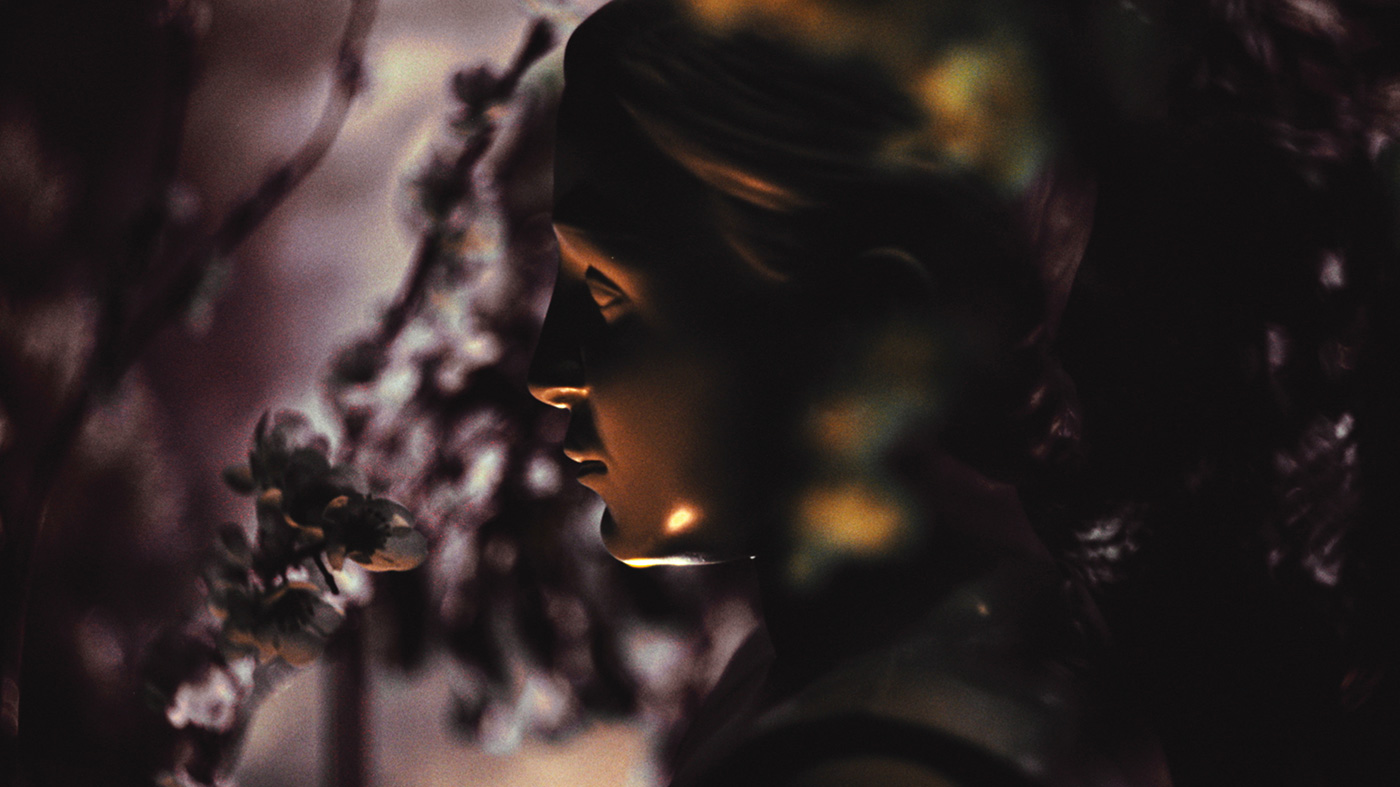
John Gillies
Scentdia
Video | 0 | color | 5:20 | Australia | 2025
During its wanderings in a nocturnal forest, a robot encounters various flowers and plants, confronting the natural world and attempting to smell the scent of a wild bloom.
John Gillies is a Sydney (Eora)-based artist who has been creating work with time-based media, including performance, moving image, installation, music and sound, since the 1980s. Drawing on the world of experimental theatre and the languages of video and cinema, his art practice is often improvisational and collaborative.
Pierre-jean Giloux
Catalogue : 2026Biomimetic Stories # 3. Dholera | Experimental fiction | 4k | color | 7:0 | France | 2024
Pierre-jean Giloux
Biomimetic Stories # 3. Dholera
Experimental fiction | 4k | color | 7:0 | France | 2024
Dholera reveals the dystopian vision of this eponymous city, envisioned in the desert-like landscape of the Indian state of Gujarat. The city’s vast network of highways, elevated railways, electric pylons and water towers extend as far as the eye can see on an arid terrain devoid of vegetation, swept through by dust whirlwinds. This vast urban project— for which ground was broken over a decade ago—has now come to a virtual standstill. In-situ footage captured via drone reveals the enormity of this unfinished project through the virtual implantation of certain symbolic buildings featured in the initial project, through the use of point clouds. The ghost of Dholera city is brought forth through the film; a phantom construction site where future ruins create cracks in the very idea of utopia.
Pierre Jean Giloux, born in 1965, was awarded the Villa Kujoyama residency in Kyoto in 2015 and received the Grand Prix for Video Art at the Côté Court Festival in Pantin in 2016. Working in a form of augmented reality, he presents his installations in museums and art centres such as the Museum of Botany in Brussels, La Criée – Centre for Contemporary Art in Rennes, the Barbican in London, the Hiroshima MoMA and the National Museum of Osaka in Japan, as well as in galleries including DNA (Berlin), Sophie Scheidecker and Christophe Gaillard (Paris), Cristina Guerra (Lisbon) and Bank MABsociety (Shanghai). His works are held in private collections (in Paris, Rennes, Brussels and Tokyo, as well as the Pierre Darier Collection in Switzerland and the An-Sammlung in Munich) and in public collections (Fonds d’art contemporain – Paris Collection and the City of Marseille).
Catalogue : 2018Invisible Cities | Video | hdv | color | 0:0 | France, Japan | 2017
Pierre-jean Giloux
Invisible Cities
Video | hdv | color | 0:0 | France, Japan | 2017
"Invisible Cities" 2015/2017 form a video tetralogy that draws portraits of several Japanese cities and questions the notions of urban landscapes. These futuristic fictions have as departure points the Japanese urban and social realities filmed and photographed and then extended by images of syntheses, what is commonly called augmented reality. Pierre-Jean Giloux resided at Villa Kujoyama in Kyoto where he directed "Stations" the fourth and final installment of "Invisible Cities".
The work of Pierre Jean Giloux is the result of ongoing research related to new technologies, especially to associations and hybridised photographic images, videos and computer graphics. Through digital technology, he developes a work of collage, the editing of visual and sound compositions that ometimes include 2d and 3d animation sequences. Pierre Jean Giloux seeks to create a language usi ng sound and image that combines elements of pop culture and the mass media with more "learned" cultures which refer to the visual arts and architecture. His video films are in between, they draw heavily from reality tending towards fiction.He likes to cohabit the virtual and the real with the aim of establishing a dialogue and questioning our relation to the real. There is a common denominator in all these films, the making of staged worlds, built on elliptical modes.The post production work gives him the opportunity to rework the images, which has the effect of altering the perception of the real, putting a distance in place. The installations of Pierre Jean Giloux, whether photographic o r filmic are structured, composed, but still leave the viewer a great deal of freedom for association and interpretation.
Catalogue : 2016Metabolism | Fiction | hdv | color | 11:0 | France, Japan | 2015
Pierre-jean Giloux
Metabolism
Fiction | hdv | color | 11:0 | France, Japan | 2015
Metabolism : “Le point de départ est la découverte d’un photomontage de Arata Isozaki intitulé “Re-ruined Hiroshima”. Cette image est une énigme : dans ce paysage dévasté, deux grandes formes architecturées se dessinent : ces structures constituées (on le suppose) par des débris récupérés dans les alentours, surplombent une ville mise à terre. Les métabolistes (un groupe d’urbanistes et d’architectes japonais autour d’une même vision : la ville du futur ) ont projeté de reconstruire ce pays, de (lui) façonner une nouvelle identité. Ce fut une sorte d’élan tendu vers l’avenir, vers un futur développement de l’espace urbain qui devait répondre aux flux des populations vers les centres urbains. Ils s’inscrivirent néanmoins dans une continuité idéoloqique ‘traditionnelle’ faisant référence à l’image iconique du temple d’Ise . Le métabolisme fût la dernière utopie moderniste du XXème siècle, cette découverte m’a passionné et a suscité le désir de faire ce film. Certains de leurs projets non réalisés sont introduits dans ce film par le truchement des techniques numériques, dans le Tokyo de 2015. Jalons historiques et présences fantomatiques inscrites dans les strates urbaines de la mégapole japonaise.
Qu’il soit filmique ou photographique, le travail de Pierre Jean Giloux débute par le stade préparatoire du dessin, phases de recherches où la pensée s’organise par strates, avant de passer à la réalisation. Ses installations photographiques composées de suites d’images peuvent être qualifiées de « storyboards agrandis ». Ces dernières -le plus souvent exposées en milieux urbains- se confrontent aux rapports d’échelles et questionnent le statut de l’image au sein même de la cité. Ses travaux vidéo sont les résultats d’associations et hybridations d’images. Il développe par le biais des techniques numériques un travail de collage, montage, de compositions visuelles et sonores qui incluent des séquences animées en 2 et 3 d. Il aime à faire cohabiter le virtuel et le réel dans le dessein d’établir un dialogue et de questionner notre rapport au réel et vice versa. En 2015, Pierre-Jean Giloux à la Villa Kujoyama (Kyoto, Japon) où il réalise le quatrième et dernier volet de “Invisible Cities” intitulé “Station to Station”. Ses installations vidéos et ses films ont été exposés dans de nombreuses institutions et festivals, notamment le Centre Pompidou, le MAC VAL, le CREDAC, Comix Home Base de Hong Kong, au Kyoto Art Center, au Pavillon de l’Arsenal à Paris.
Charlotte Ginsborg
Catalogue : 2010Over The Bones | Experimental film | 16mm | color | 30:0 | United Kingdom | 2008
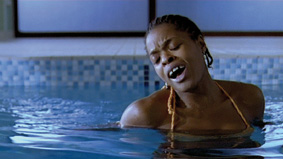
Charlotte Ginsborg
Over The Bones
Experimental film | 16mm | color | 30:0 | United Kingdom | 2008
The film interweaves documentary and fiction to depict two characters, a truck driver and a singer. Filmed in their separate working environments their stories converge until they meet through an accident at a swimming pool. The driver witnesses the singer crashing into the end of the pool and passing out. He performs mouth-to-mouth resuscitation. Waking the next day the driver discovers he has developed a desire to write music. For the next six months his singing career develops at a rapid pace. The singer temporarily looses her voice, on regaining it she discovers that it has dramatically altered in tone. Although the tale is told retrospectively no conclusion is reached. Is he continuing to sing, did she regain her career, have they permanently swapped voices? He continues on his journey. By combining voice over, interview footage and dramatic tableaux, questions arise as to whether the events are true and to what extent the cast are acting. The film investigates what happens to people once placed in front of a camera and subsequently how a filmmaker can attempt to capture individuals continually shifting performances in real life. How we adjust ?self? in relationship to ?other? and what role storytelling has in the everyday are developed into key questions. By combining voice over, interview footage and dramatic tableaux, questions arise as to whether the events unfolding are true and to what extent the cast are acting. Are the characters figments of each other?s imaginations? Or in fact each other?s alter egos? The film investigates what happens to people once placed in front of a camera and subsequently how a filmmaker can attempt to capture the subtlety of individuals continually shifting performances in real life. How and why we adjust ?self? in relationship to ?other? and what role storytelling has in the everyday are developed into key questions.
Charlotte Ginsborg graduated from MA Fine Art at Goldsmiths College, London in 2002 where she specialized in film and video. Her films interweave documentary and fictional elements to explore people?s psychological relationship to their architectural environments. She has exhibited her 16mm and digital films in galleries and festivals both nationally and internationally, including the Venice Biennale, the Serpentine Gallery and the ICA, London, the Pompidou Centre, Paris and the Walker Arts Centre, USA. She won the Oriel Mostyn Open 03 for her film ?Spade? and had a solo exhibition at the Jerwood Foundation, London. Her films are distributed by The Lux and she is currently artist in residence at The London Chest Hospital.
Catalogue : 2009The Mirroring Cure | Experimental film | 16mm | color | 28:0 | United Kingdom | 2006
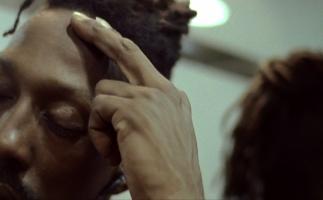
Charlotte Ginsborg, Ginsborg
The Mirroring Cure
Experimental film | 16mm | color | 28:0 | United Kingdom | 2006
Tracing the life of a large construction site from demolition to the completion of new office space, `The Mirroring Cure` focuses on the company secretary who decides to interview those employed around her. She wants to understand their relationship to work, their hopes, fears and anxieties. We witness her fascination with one of the architects whom she discovers suffers from a loss of balance exacerbated by the large scale of the site. She becomes intrigued by the bizarre and surreal solution he develops to cope with his affliction. Appearing initially as a documentary detailing the complexity of personal identities formed through being `at work`, as well as the effects of architecture on behaviour, the film begins to incorporate fictional elements leaving the viewer unsure as to where reality lies. To what extent the characters are acting remains ambiguous. Shot on 16mm over a two year period the film forms an intimate portrait of five working lives set against the visually arresting and constantly shifting architecture of the building development. It investigates how people negotiate private experiences within the public domain and how we ?view? and ?judge? others as we move through the city.
Charlotte Ginsborg graduated from the MA Fine Art course at Goldsmiths College, London in 2001 where she specialized in film and video. Her films interweave documentary and fictional elements to explore people?s psychological relationship to their jobs and their working architectural environments. She has screened her 16mm and digital films in galleries and festivals both nationally and internationally. Including the Venice Biennale 2003, the Serpentine Gallery London, 2004, the Camden Arts Centre and the Curzon, Soho, London 2006, The ICA, London, 2007 and The Walker Arts centre, 2008. She has had solo exhibitions at The Jerwood Foundation, The Whitechapel Project Space and The Lux, who distribute her work. She has also undertaken various public art commissions and documentary projects and is currently the Artist-in-residence at the London Chest Hospital where she is working with staff and patients to develop a new film work. Her latest film ?Over The bones? (16mm, 30min, 2008), commissioned and funded by The Jerwood Foundation and The Arts Council England, is just about to be screened at The Kasseler Dokumentarfilm-&Videofest and furthers her interests in character development and disrupted narrative, investigating the complex performative space provided by the filming process.
Charlotte Ginsborg, Ginsborg
Catalogue : 2010Over The Bones | Experimental film | 16mm | color | 30:0 | United Kingdom | 2008

Charlotte Ginsborg
Over The Bones
Experimental film | 16mm | color | 30:0 | United Kingdom | 2008
The film interweaves documentary and fiction to depict two characters, a truck driver and a singer. Filmed in their separate working environments their stories converge until they meet through an accident at a swimming pool. The driver witnesses the singer crashing into the end of the pool and passing out. He performs mouth-to-mouth resuscitation. Waking the next day the driver discovers he has developed a desire to write music. For the next six months his singing career develops at a rapid pace. The singer temporarily looses her voice, on regaining it she discovers that it has dramatically altered in tone. Although the tale is told retrospectively no conclusion is reached. Is he continuing to sing, did she regain her career, have they permanently swapped voices? He continues on his journey. By combining voice over, interview footage and dramatic tableaux, questions arise as to whether the events are true and to what extent the cast are acting. The film investigates what happens to people once placed in front of a camera and subsequently how a filmmaker can attempt to capture individuals continually shifting performances in real life. How we adjust ?self? in relationship to ?other? and what role storytelling has in the everyday are developed into key questions. By combining voice over, interview footage and dramatic tableaux, questions arise as to whether the events unfolding are true and to what extent the cast are acting. Are the characters figments of each other?s imaginations? Or in fact each other?s alter egos? The film investigates what happens to people once placed in front of a camera and subsequently how a filmmaker can attempt to capture the subtlety of individuals continually shifting performances in real life. How and why we adjust ?self? in relationship to ?other? and what role storytelling has in the everyday are developed into key questions.
Charlotte Ginsborg graduated from MA Fine Art at Goldsmiths College, London in 2002 where she specialized in film and video. Her films interweave documentary and fictional elements to explore people?s psychological relationship to their architectural environments. She has exhibited her 16mm and digital films in galleries and festivals both nationally and internationally, including the Venice Biennale, the Serpentine Gallery and the ICA, London, the Pompidou Centre, Paris and the Walker Arts Centre, USA. She won the Oriel Mostyn Open 03 for her film ?Spade? and had a solo exhibition at the Jerwood Foundation, London. Her films are distributed by The Lux and she is currently artist in residence at The London Chest Hospital.
Catalogue : 2009The Mirroring Cure | Experimental film | 16mm | color | 28:0 | United Kingdom | 2006

Charlotte Ginsborg, Ginsborg
The Mirroring Cure
Experimental film | 16mm | color | 28:0 | United Kingdom | 2006
Tracing the life of a large construction site from demolition to the completion of new office space, `The Mirroring Cure` focuses on the company secretary who decides to interview those employed around her. She wants to understand their relationship to work, their hopes, fears and anxieties. We witness her fascination with one of the architects whom she discovers suffers from a loss of balance exacerbated by the large scale of the site. She becomes intrigued by the bizarre and surreal solution he develops to cope with his affliction. Appearing initially as a documentary detailing the complexity of personal identities formed through being `at work`, as well as the effects of architecture on behaviour, the film begins to incorporate fictional elements leaving the viewer unsure as to where reality lies. To what extent the characters are acting remains ambiguous. Shot on 16mm over a two year period the film forms an intimate portrait of five working lives set against the visually arresting and constantly shifting architecture of the building development. It investigates how people negotiate private experiences within the public domain and how we ?view? and ?judge? others as we move through the city.
Charlotte Ginsborg graduated from the MA Fine Art course at Goldsmiths College, London in 2001 where she specialized in film and video. Her films interweave documentary and fictional elements to explore people?s psychological relationship to their jobs and their working architectural environments. She has screened her 16mm and digital films in galleries and festivals both nationally and internationally. Including the Venice Biennale 2003, the Serpentine Gallery London, 2004, the Camden Arts Centre and the Curzon, Soho, London 2006, The ICA, London, 2007 and The Walker Arts centre, 2008. She has had solo exhibitions at The Jerwood Foundation, The Whitechapel Project Space and The Lux, who distribute her work. She has also undertaken various public art commissions and documentary projects and is currently the Artist-in-residence at the London Chest Hospital where she is working with staff and patients to develop a new film work. Her latest film ?Over The bones? (16mm, 30min, 2008), commissioned and funded by The Jerwood Foundation and The Arts Council England, is just about to be screened at The Kasseler Dokumentarfilm-&Videofest and furthers her interests in character development and disrupted narrative, investigating the complex performative space provided by the filming process.
Anton Ginzburg
Catalogue : 2017Turo | Experimental fiction | hdv | color | 35:0 | USA | 2016
Anton Ginzburg
Turo
Experimental fiction | hdv | color | 35:0 | USA | 2016
“Turo” is a film exploring post-Soviet geography and Constructivist architecture. It is made up four chapters and an introduction-index. Each chapter is exploring a different Constructivist building as a stage for past utopias. The buildings are landmarks of Soviet modernism: Melnikov House (architect Konstantin Melnikov), Narkomfin Building (architect Moisei Ginzburg), ZIL (Automobile factory designed by Vesnin brothers) and also recording of a “ghost mode” of a video game exploring ruins of Pripyat’ (Soviet town affected by Chernobyl catastrophe) featuring unrealized Tatlin’s Tower. Since a lot of Constructivist projects were never realized and existed as potential designs, they are placed into the virtual environments of the video game, positioning utopia within dystopia. It’s an atemporal collective territory, where past dreams coincide with current consumer culture. Modernity could be interpreted as an updated Babel Tower project where the universal tongue would have been imposed over the rest of the world. It still resonates deeply with contemporary culture, but today it exists as an archive of ruins, the record of fragmentation. Exploring various methods of representation the video’s structure combines cinematic approach with layering and digital abstraction. Each part of the film is a metaphorical tower that gets deconstructed throughout the duration of the chapter. Some parts are direct cinematic narratives, like an enormous blaze, while others show use projected images, deconstruction of an image and shaping its potential meanings on the basis of technological reproduction.
Anton Ginzburg is a New York–based artist and filmmaker who uses an array of historical and cultural references as starting points for his investigations into art’s capacity to penetrate layers of the past and reflect on the contemporary experience. Born in 1974 in Saint Petersburg, Russia, Ginzburg received a classical arts education before immigrating to the United States in 1990. He earned a BFA from Parsons The New School for Design and MFA degree from Bard College (Milton Avery Graduate School). His art has been shown at the 54th Venice Biennale, Blaffer Art Museum, Lille3000, Palais de Tokyo in Paris, the San Francisco Museum of Modern Art, White Columns, the first and second Moscow Biennales, and the Smithsonian Cooper-Hewitt, National Design Museum. Screenings included IFFR, NYFF/Projections, Les Rencontres Internationales Moscow International Film Festival, Arkipel/Jakarta, Exis/Korea and Images/Toronto.
Catalogue : 2015Pan | Experimental film | 16mm | color | 5:45 | USA | 2014
Anton Ginzburg
Pan
Experimental film | 16mm | color | 5:45 | USA | 2014
The film Pan (2014) by Anton Ginzburg, explores the genealogy and interactions of reproduction technologies from 16mm film to video formats. It examines variations of the mechanical gaze and its disembodiment in relation to the architectural representation and historical context. The hybrid aura offers an interplay and reconsideration of temporal and spatial relationships.
Anton Ginzburg is a New York–based artist and filmmaker who uses an array of historical and cultural references as starting points for his investigations into art’s capacity to penetrate layers of the past and reflect on the contemporary experience. Born in 1974 in Saint Petersburg, Russia, Ginzburg received a classical arts education before immigrating to the United States in 1990. He earned a BFA from Parsons The New School for Design in 1997 and MFA degree from Bard College, Milton Avery Graduate School of Arts, Annandale-on-Hudson, New York. His art has been shown at the fifty-fourth Venice Biennale, Blaffer Art Museum at the University of Houston, Palais de Tokyo in Paris, the San Francisco Museum of Modern Art, White Columns in New York, Lille3000 in Euralille, France, the first and second Moscow Biennales, and the Cooper-Hewitt, Smithsonian Design Museum in New York. His work is represented in the permanent collections of the San Francisco Museum of Modern Art and the Moscow Museum of Modern Art, as well as in private collections around the world.
Catalogue : 2013Hyperborea | Experimental fiction | hdv | color | 45:0 | USA, Russia | 2011
Anton Ginzburg
Hyperborea
Experimental fiction | hdv | color | 45:0 | USA, Russia | 2011
In his film ?Hyperborea?, Anton Ginzburg constructs points of intersection between memory ? individual or collective ? and imagination. Drawing on the many stories about the mythical region of Hyperborea, he set out to locate it and travelled to the distant Northern territories. His expedition runs through the forests of the American Pacific Northwest, the faded palaces of Saint Petersburg, and the Gulags of Russia?s White Sea. On the trail of ancient vestiges, primary forests, mammoth fossils and ruins, the explorer is accompanied by the mysterious cloud of red smoke.
Anton Ginzburg is a New York?based artist and filmmaker who uses an array of historical and cultural references as starting points for his investigations into art?s capacity to penetrate layers of the past. Born in 1974 in Saint Petersburg, Russia, Ginzburg received a classical arts education before immigrating to the United States in 1990. He earned a BFA from Parsons The New School for Design in 1997 and is currently working on his MFA degree at Bard College. His art has been shown at the 54th Venice Biennale, Lille3000, Palais de Tokyo, the San Francisco Museum of Modern Art, White Columns, the first and second Moscow Biennales, and the Smithsonian Cooper-Hewitt, National Design Museum. His work is represented in the permanent collections of the San Francisco Museum of Modern Art and the Moscow Museum of Modern Art, as well as in private collections around the world.
Anton Ginzburg
Catalogue : 2023ML_CRSH | Experimental video | 4k | color | 3:26 | USA | 2021
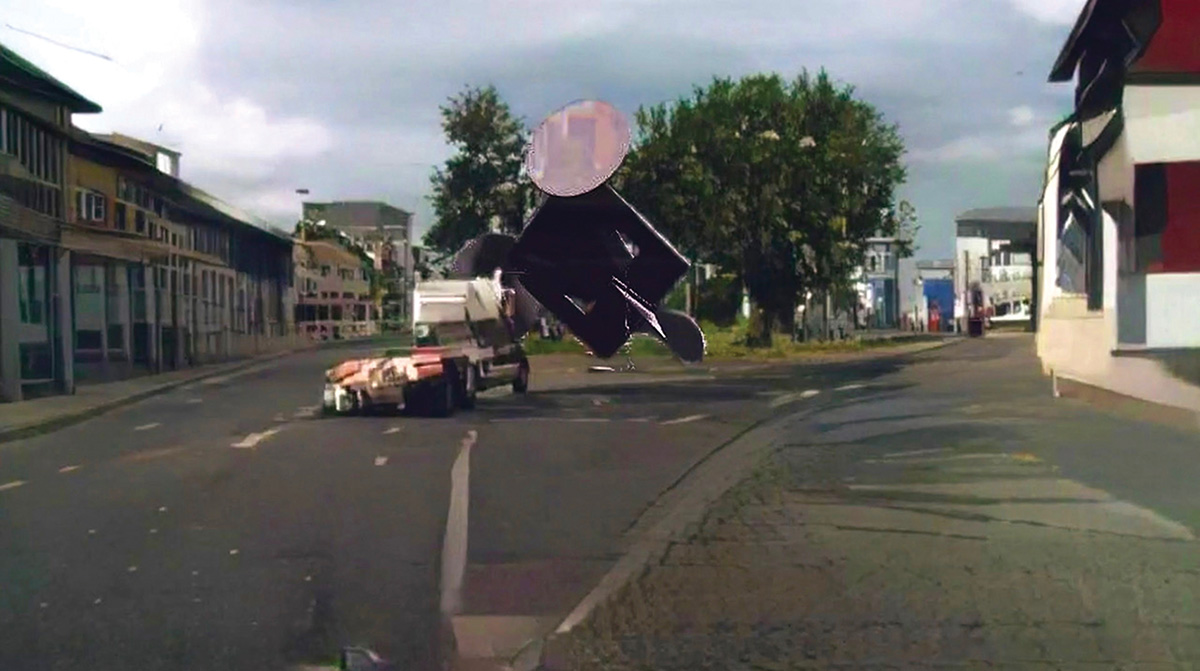
Anton Ginzburg
ML_CRSH
Experimental video | 4k | color | 3:26 | USA | 2021
“ML CRSH” is a video work that was developed using a 3D gaming engine environment for self-driving vehicles. The AI algorithm was used to apply the database collection of photo materials and textures of Dresden to the 3D models, causing unpredictable digital artifacts. The initial video was inspired by the “Media Burn” 1975 performance organized by Ant Farm collective, where a customized Cadillac drove into a wall of flaming television sets. Translating it into today’s digital environment of “database logic” of new media objects and employment of AI, it features a montage of crashes of autonomous vehicles into digital replicas of art objects. The artwork turns its focus on the proliferation of database and AI technologies and disrupts its patterns with an iconoclastic gesture of a crash.
Anton Ginzburg is a New York–based artist and filmmaker who uses an array of historical and cultural references as starting points for his investigations into art’s capacity to penetrate layers of the past and reflect on the contemporary experience. Born in 1974 in Saint Petersburg, Russia, Ginzburg received a classical arts education before immigrating to the United States in 1990. He earned a BFA from Parsons The New School for Design and MFA degree from Bard College (Milton Avery Graduate School). His art has been shown at the 54th Venice Biennale, Blaffer Art Museum, Lille3000, Palais de Tokyo in Paris, the San Francisco Museum of Modern Art, White Columns, and the Smithsonian Cooper-Hewitt, National Design Museum. Screenings included IFFR, NYFF/Projections, Ann Arbor, Go Shorts and Images/Toronto.
Eva Giolo
Catalogue : 2018Remote | Experimental film | hdv | color | 23:41 | Belgium | 2016
Eva Giolo
Remote
Experimental film | hdv | color | 23:41 | Belgium | 2016
Remote is a suggestive story. Portrait of a tender companionship in a secluded Irish countryside. Residing in the simplicity of the moment, the waiting and the repetition of days. This is a place where there is no space for imagining a future other than the perpetual repetition of the present. This is a place for survival, to be strong, alone with the wind, eyes burnt by the light. A place of unspoken tenderness, a landscape of silence and solitude in which there will always be someone.
Eva Giolo (b.1991 Brussels) is an audio visual artist. Her practice is predominantly made of filmic portraits that weave between fiction and documentary. They focus on individuals, almost always facing a certain kind of loneliness. She mainly focus on those individuals in their daily life, scripting and observing their actions and daily gestures through the camera. They often touch upon universal human themes and explore the relationship between loss, time and memory. But also the in-between language of the camera and the subject. Presenting memories, images and portraitures as something that can be manipulated and seen with multi-perspectives. Questioning the power of images is a recurrent theme and memories often stand as a central narrative. Giolo obtained a BA and MA in Fine Arts at the Media Arts department of the Royal Academy of Arts (KASK), Ghent. She completed her music education at the Institute of Contemporary Music in London. Recent screenings and exhibitions include: Imagine Science Film Festival, New York; TAZ#17, Ostend; Côté court, Paris; International Film Festival Rotterdam; Blaa Galleri, Copenhagen; BOZAR, Brussels; Courtisane Film Festival, Ghent; Ishibiki Gallery, Kanazawa; In Out Film Festival, Gdansk among others. Giolo won the VAF Wildcard for experimental film (2016) and is a founding member of the small distribution and production platform elephy. Eva Giolo is a post-grad art resident at HISK in Ghent (2018-2020). She currently works and lives in Brussels.
Eva Giolo
Catalogue : 2026Memory Is an Animal, It Barks with Many Mouths | Experimental film | 16mm | color | 24:0 | Belgium | 2025
Eva Giolo
Memory Is an Animal, It Barks with Many Mouths
Experimental film | 16mm | color | 24:0 | Belgium | 2025
Eva Giolo’s latest work takes us to Val Gardena, where people still speak Ladin, a Rhaeto-Romance language. Giolo subverts the usual representation of mountain communities to deliver a portrait of a precious cultural heritage in constant evolution. Here, the inhabitants preserve and nurture their culture for future generations with awareness of the world and creativity. Shot on 16mm film sensitive to the grandeur and fragility of nature, Memory Is an Animal, It Barks with Many Mouths is an exquisite essay on the vital importance of linguistic diversity.
Eva GIOLO (1991, Belgium) is an artist working in film, video and installation. Her work places particular focus on the female experience, employing experimental and documentary strategies to explore themes of intimacy, permanence and memory, along with the analysis of language and semiotics. Her films, installations and other projects have been widely exhibited internationally at festivals, museums and galleries, including Sadie Coles HQ, Viennale, FIDMarseille, IFFR, New York Film Festival and many others. Her film Flowers blooming in our throats (2020) was nominated for The European Film Award and awarded the Top Prize at THIS IS SHORT 2021. She also received the National Award Special Mention at Lago Film Fest 2021, the Jury Special Mention at First Crossings Festival and the Critics’s Jury Award at 25FPS Festival. She is a laureate from HISK (2018-2020) and a former art resident at SeMA NANJI (2020), the year-long film–writing residency Conversation #4 (CVB, GSARA and Beursschouwburg), CASTRO studio program (2021), WIELS (2021), RU Unlimited New York and Fogo Island Arts (2022). Her films are distributed by elephy and Light Cone.
Catalogue : 2025Stone, Hat, Ribbon and Rose | Experimental film | 16mm | color | 16:0 | Belgium | 2024
Eva Giolo
Stone, Hat, Ribbon and Rose
Experimental film | 16mm | color | 16:0 | Belgium | 2024
Part of the YOURS project, an assemblage of five short films dedicated to Chantal Akerman, STONE, HAT, RIBBON AND ROSE offers a strictly personal and decidedly fragmented guide to Brussels; this idiosyncratic city symphony takes us across different urban terrains and unveils each location’s visual and sonic wonders. Amplifying the film’s elusive, drifting quality are a series of one-person performances involving disparate objects in the city. Playful and sombre, quotidian and fantastic, Eva Giolo’s film is a tender love letter to Akerman’s work. (Hyun Jin Cho)
Eva Giolo is an artist working across film, video, and installation. Her work has been exhibited at Sadie Coles HQ, Harlan Levey Project, WIELS centre for Contemporary Art , MAXXI–National Museum of 21st Century Art, Kunstmuseum Den Haag, BOZAR Centre for Fine Arts, Palazzo Strozzi, Museum of Contemporary Art Antwerp, Kunsthalle Wien, and major film festivals like International Film Festival Rotterdam, Viennale, FIDMarseille and Vision du Réel among others. She is a founding member of the production and distribution platform elephy.
Marina Gioti
Catalogue : 2010To Krifo Scholio | Experimental film | 16mm | black and white | 10:0 | Greece | 2009
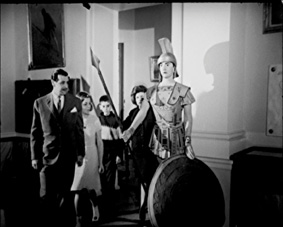
Marina Gioti
To Krifo Scholio
Experimental film | 16mm | black and white | 10:0 | Greece | 2009
Greece, the early 70?s. A family visits the museum of the 1821 Greek Revolution and War against the Turks. As they wander inside the museum, one of the paintings comes to life ... ?Sabotaged? version of a rare -found- propaganda film,produced during the Greek military junta in the 70s, supporting a largely debated fact -for many a national myth- related to the birth of the modern Greek nation and the construction of its ethnic identity.
Born in Athens, Greece, Marina Gioti has studied Chemical Engineering, Environmental Management (MSc), Filmmaking and Media and Communication (MA) in Greece and the UK. Since 1999 she lives and works in Athens as a filmmaker/ video artist working mainly with found footage and animation. She has presented work at festivals and galleries in Athens, Europe and the United States, notably at the Toronto International Film Festival, The Rencontres Internationales, Cinematexas, New York Underground Film Festival and Transmediale festival in Berlin. She is also working as an independent curator and film programmer organizing art exhibitions and experimental film and documentary screenings around Athens.
Catalogue : 2007b-alles | Experimental video | dv | color | 2:0 | Greece | 2005
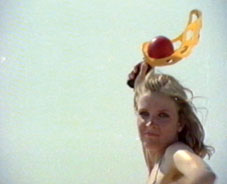
Marina Gioti
b-alles
Experimental video | dv | color | 2:0 | Greece | 2005
A Greek TV-commercial from the 80s of a product-action racquet game- that failed to become a success in the local market, is being manipulated anew in terms of image and sound. Apart from a funny rhythmical reworking of a rather trite found footage, this work aims at presenting a comical and simplistic view of how American products and trends have been implanted on our collective subconscious through advertising.
Marina Gioti is a filmmaker based in Athens, Greece. Her film and video work has been presented at various festivals and special screenings around Europe and the United States. Her most recent video "B-alles" was an official selection at: New York and Chicago Underground Film Festivals, Cinematexas 11, Hi/Lo Film Festival, Hull International Short Film Festival, among others. She also works as an independent film and video curator, programming and organizing experimental film and video screenings at various venues around Athens, mainly under the name "novaXpress". She has also programmed for Synch Festival (artistic director Synch Cinema 2005) and Cinematexas. She is the co-curator of the art exhibition "Anathena", which recently opened at the Deste Foundation (Athens, Greece).
Christoph Girardet, Matthias Müller
Catalogue : 2026One Hundred Years Later | Experimental film | mov | black and white | 7:55 | Germany | 2025
Christoph Girardet
One Hundred Years Later
Experimental film | mov | black and white | 7:55 | Germany | 2025
In 1939, a second unit with a double and extras filmed scenes for the Hollywood classic “Mr. Smith Goes to Washington” in the Lincoln Memorial. The succession of the long, sorted-out plan sequences undermines the classic cinematic narration; the plot does not seem to progress. The neoclassical architecture remains the setting for a recurring and questionable ritual, in which the protagonist is lost.
Christoph Girardet, born in 1966, is a German video artist and filmmaker. Girardet makes both the accidentally found and the extensively researched found footage from the archives of film history the subject of his art. Montage, omissions, and repetitions reveal the actual structures and inner mechanism of the depicted cinematic reality. Beyond the analysis of the material and its clichés, his work deals in essence with a melancholic state of absence, thus creating an individual pictorial world. From 1988 to 1994, Girardet studied Visual Arts at the Braunschweig University of Art (HBK) in the film class of Birgit Hein. Since 1989 he has produced films, videos and video installations, some of them in collaboration with video artist Volker Schreiner (1994 – 2004), and, more frequently, in collaboration with filmmaker Matthias Müller (1999 – ongoing). Girardet has participated in group shows at the Stedelijk Van Abbemuseum, Eindhoven, MoMA PS1, New York, Palais de Tokyo, Paris, Hirshhorn Museum, Washington, and Eye Filmmuseum, Amsterdam, among others. He had solo exhibitions at institutions such as FACT, Liverpool, Kunstverein Hannover and West, The Hague. He has taken part in major film festivals worldwide, including the festivals at Cannes, Venice, Berlin, Toronto, Locarno, Oberhausen and Rotterdam. His work is included in public and private collections. He has received numerous awards, among them a stipend for the International Studio and Curatorial Program in New York (2000) and a scholarship at Villa Massimo in Rome (2004). He lives and works in Hanover, Germany.
Catalogue : 2025Jishin | Experimental film | hdv | black and white | 8:0 | Germany | 2022
Christoph Girardet
Jishin
Experimental film | hdv | black and white | 8:0 | Germany | 2022
Jishin (Japanese: earthquake) shows an archaic-looking special effect for a Hollywood film of the 1940s: a house begins to sway, stone lanterns fall over, an actor loses his grip. Finally, mountains of debris fill the screen. The drama is repeated in five successive, slightly varied camera perspectives. The uncut raw material allows an analytical view of the clichéd and scenery-like setting: the disaster is not due to a natural event but to a precalculated performance.
born in Langenhagen, Germany, in 1966, studied Visual Arts at the Braunschweig University of Art (HBK). Since 1989 he has produced films, videos and video installations, some of them in collaboration with video artist Volker Schreiner (1994 – 2004), and, more frequently, in collaboration with filmmaker Matthias Müller (1999 – 2022). He lives and works in Hanover, Germany.
Catalogue : 2022Misty Picture | Experimental film | 4k | color | 16:32 | Germany | 2021
Christoph Girardet, Matthias Müller
Misty Picture
Experimental film | 4k | color | 16:32 | Germany | 2021
Twenty years ago, the towers of the New York World Trade Center collapsed. The endlessly repeating television images of this event were preceded by manyfold stagings of the building, either as a highly symbolic icon, a speculative destruction fantasy or merely as a spectacular backdrop. In Misty Picture, such fictional motifs string together: city symphony, disaster movie and medial trauma therapy become one.
Christoph Girardet, born in Langenhagen, Germany, in 1966. Lives in Hannover. Studied at the Braunschweig HBK. Matthias Müller, born in Bielefeld, Germany, in 1961. Lives in Bielefeld and Cologne. Studied at the Bielefeld University and at the Braunschweig HBK. Collaborative works since 1999
Catalogue : 2018It Was Still Her Face | Experimental film | hdv | black and white | 8:0 | Germany | 2017
Christoph Girardet
It Was Still Her Face
Experimental film | hdv | black and white | 8:0 | Germany | 2017
Portraits of women. And men, who are spellbound by them. The painted portraits, a recurring motif of film noir as well as European postwar cinema, aesthetically stand in a tradition of an outmoded academic style that is bent on striking likeness with the model. They are revenants, omens of absence, metaphors for loss and death, objects of desire and fixation, which mesmerize both the viewer in the movie and in front of the screen.
Christoph Girardet, born in Langenhagen, Germany, in 1966. Lives in Hannover. Studied at the Braunschweig HBK. filmography (single channel, selection) 1991 Schwertkampf 1993 Fieberrot 1996 Release 2001 Scratch 2002 Absence 2004 Fiction Artists (with Volker Schreiner) 2007 Pianoforte | Storyboard 2012 The Eternal Lesson | Dirigible 2014 Fabric 2015 Synthesis 2017 It Was Still Her Face collaborations with Matthias Müller 1999 Phoenix Tapes 2002 Manual | Beacon 2003 Play | Mirror 2006 Kristall 2009 Contre-jour | Maybe Siam 2011 Meteor 2013 Cut 2016 personne
Catalogue : 2015Fabric | Experimental film | hdv | black and white | 9:52 | Germany | 2014
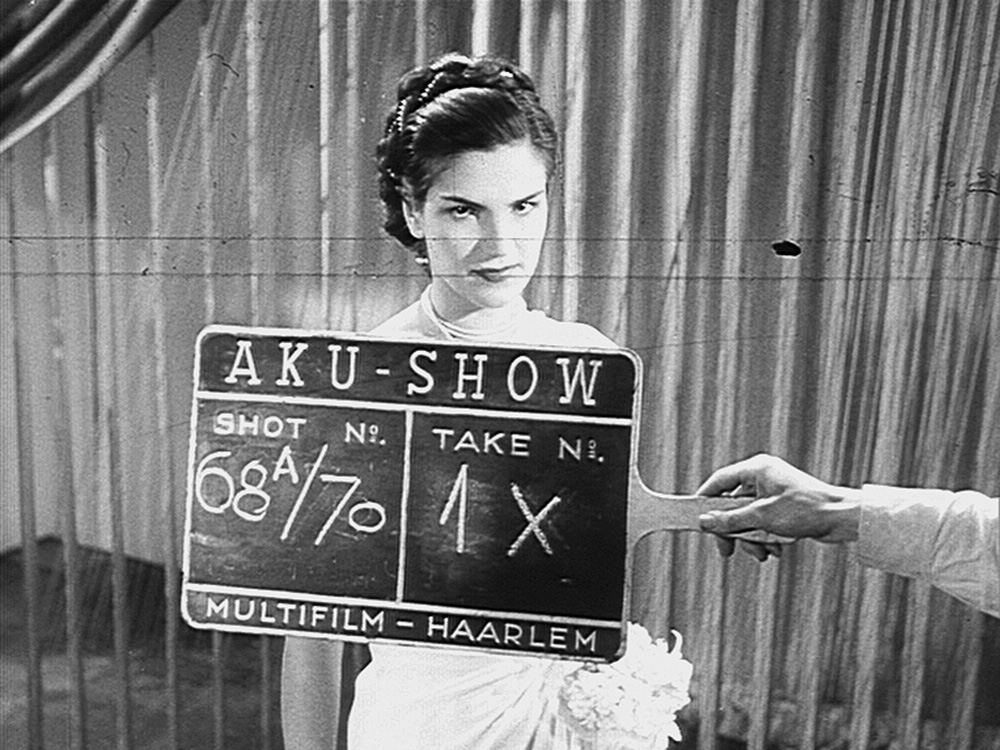
Christoph Girardet
Fabric
Experimental film | hdv | black and white | 9:52 | Germany | 2014
Fabric is a montage based on remaining workprints from a commercial film about viscose that no longer exists. The original attempt of the film to visualize perfect images of a young tailor and models dressed in sensual fabric while acting within a decorative modernist setting is mirrored in its shortcoming. The leftovers only show the preliminaries, faulty repetitions and aborted takes, thus all footage which was thrownout. Clapper boards indicating each take by numbers allowed to reconstruct a part of the film’s original storyboard. The new montage shows all of the remaining snippets from the related scenes including the clapper boards, the repeated takes and the glitches in the film material. However, all parts which probably have been used to edit the original film are missing, the gaps are marked with beeps on the otherwise silent soundtrack. While following a fragile new narrative, Fabric also generates a counterpart of an artefact that was lost.
Christoph Girardet, born in Langenhagen, Germany, in 1966. He studied Fine Arts at the Braunschweig School of Art (Master’s degree in 1994). Since 1989 he has produced video tapes, video installations and films, some of them in collaboration with video artist Volker Schreiner beginning in 1994 and as of 1999 with filmmaker Matthias Müller. He was awarded a stipend for the International Studio and Curatorial Program in New York (2000) and the Villa Massimo stipend in Rome (2004). He lives and works in Hanover.
Catalogue : 2011Maybe Siam | Experimental film | betaSP | color and b&w | 12:20 | Germany | 2009
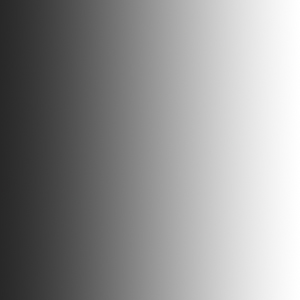
Christoph Girardet, Matthias Müller
Maybe Siam
Experimental film | betaSP | color and b&w | 12:20 | Germany | 2009
They call me a dreamer, well maybe I am. / But I know that I`m burnin` to see / Those far away places with the strange-soundin` names / Callin`, callin` me. (no translation, English only, please)
Christoph Girardet, born in Langenhagen, Germany, in 1966. Lives in Hannover. Works in video, film and installation since 1987. Studied at the Braunschweig HBK. Selected works: 1991 Schwertkampf, 1997 Release, 2001 Scratch, 2001 7:48, 2002 Absence, 2007 Pianoforte, 2010 Silberwald Matthias Müller, born in Bielefeld, Germany, in 1961. Lives in Bielefeld and Cologne. Works in film, video and photography since 1980. Studied at the Bielefeld University and at the Braunschweig HBK. Selected works: 1990 Home Stories, 1994 Alpsee, 1998 Vacancy, 2000 nebel, 2004 Album. Joint projects of Christoph Girardet and Matthias Müller: Phoenix Tapes 1999, Manual 2002, Beacon 2002, Play 2003, Mirror 2003, Ray 2004, Catch 2005, Ground 2005, Hide 2006, Kristall 2006, Locomotive 2008, Contre-jour 2009, Maybe Siam 2009
Catalogue : 2009Storyboard | Art vidéo | betaSP | color | 5:0 | Germany | 2007
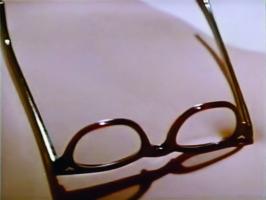
Christoph Girardet
Storyboard
Art vidéo | betaSP | color | 5:0 | Germany | 2007
Storyboard is a collage made from a variety of randomly found images: empty spaces, enigmatic gestures, artificial environments. Is this life according to a cinematic memory?
Christoph Girardet was born in 1966 in Langenhagen and lives in Hanover, Germany. He studied Fine Arts at the School of Art in Braunschweig. He works since 1987 on video, film and installation. He began to collaborate in 1994 with video director Volker Schreiner, and in 1999 with Matthias Müller (Phoenix Tapes), with whom he made numerous projects using digital techniques as a resource. He explores, amongst other subjects, the banalities of industrial filmmaking. Girardet has participated in collective exhibitions in prestigious institutions as Stedelijk Van Abbemuseum (Eindhoven) and the P.S.1 Contemporary Art Center in New York. Individual exhibits of his work have taken place at Kunstverein in Hanover and at the Sean Gallery in New York. He has received numerous awards.
Christoph Girardet
Catalogue : 2026One Hundred Years Later | Experimental film | mov | black and white | 7:55 | Germany | 2025
Christoph Girardet
One Hundred Years Later
Experimental film | mov | black and white | 7:55 | Germany | 2025
In 1939, a second unit with a double and extras filmed scenes for the Hollywood classic “Mr. Smith Goes to Washington” in the Lincoln Memorial. The succession of the long, sorted-out plan sequences undermines the classic cinematic narration; the plot does not seem to progress. The neoclassical architecture remains the setting for a recurring and questionable ritual, in which the protagonist is lost.
Christoph Girardet, born in 1966, is a German video artist and filmmaker. Girardet makes both the accidentally found and the extensively researched found footage from the archives of film history the subject of his art. Montage, omissions, and repetitions reveal the actual structures and inner mechanism of the depicted cinematic reality. Beyond the analysis of the material and its clichés, his work deals in essence with a melancholic state of absence, thus creating an individual pictorial world. From 1988 to 1994, Girardet studied Visual Arts at the Braunschweig University of Art (HBK) in the film class of Birgit Hein. Since 1989 he has produced films, videos and video installations, some of them in collaboration with video artist Volker Schreiner (1994 – 2004), and, more frequently, in collaboration with filmmaker Matthias Müller (1999 – ongoing). Girardet has participated in group shows at the Stedelijk Van Abbemuseum, Eindhoven, MoMA PS1, New York, Palais de Tokyo, Paris, Hirshhorn Museum, Washington, and Eye Filmmuseum, Amsterdam, among others. He had solo exhibitions at institutions such as FACT, Liverpool, Kunstverein Hannover and West, The Hague. He has taken part in major film festivals worldwide, including the festivals at Cannes, Venice, Berlin, Toronto, Locarno, Oberhausen and Rotterdam. His work is included in public and private collections. He has received numerous awards, among them a stipend for the International Studio and Curatorial Program in New York (2000) and a scholarship at Villa Massimo in Rome (2004). He lives and works in Hanover, Germany.
Catalogue : 2025Jishin | Experimental film | hdv | black and white | 8:0 | Germany | 2022
Christoph Girardet
Jishin
Experimental film | hdv | black and white | 8:0 | Germany | 2022
Jishin (Japanese: earthquake) shows an archaic-looking special effect for a Hollywood film of the 1940s: a house begins to sway, stone lanterns fall over, an actor loses his grip. Finally, mountains of debris fill the screen. The drama is repeated in five successive, slightly varied camera perspectives. The uncut raw material allows an analytical view of the clichéd and scenery-like setting: the disaster is not due to a natural event but to a precalculated performance.
born in Langenhagen, Germany, in 1966, studied Visual Arts at the Braunschweig University of Art (HBK). Since 1989 he has produced films, videos and video installations, some of them in collaboration with video artist Volker Schreiner (1994 – 2004), and, more frequently, in collaboration with filmmaker Matthias Müller (1999 – 2022). He lives and works in Hanover, Germany.
Catalogue : 2022Misty Picture | Experimental film | 4k | color | 16:32 | Germany | 2021
Christoph Girardet, Matthias Müller
Misty Picture
Experimental film | 4k | color | 16:32 | Germany | 2021
Twenty years ago, the towers of the New York World Trade Center collapsed. The endlessly repeating television images of this event were preceded by manyfold stagings of the building, either as a highly symbolic icon, a speculative destruction fantasy or merely as a spectacular backdrop. In Misty Picture, such fictional motifs string together: city symphony, disaster movie and medial trauma therapy become one.
Christoph Girardet, born in Langenhagen, Germany, in 1966. Lives in Hannover. Studied at the Braunschweig HBK. Matthias Müller, born in Bielefeld, Germany, in 1961. Lives in Bielefeld and Cologne. Studied at the Bielefeld University and at the Braunschweig HBK. Collaborative works since 1999
Catalogue : 2018It Was Still Her Face | Experimental film | hdv | black and white | 8:0 | Germany | 2017
Christoph Girardet
It Was Still Her Face
Experimental film | hdv | black and white | 8:0 | Germany | 2017
Portraits of women. And men, who are spellbound by them. The painted portraits, a recurring motif of film noir as well as European postwar cinema, aesthetically stand in a tradition of an outmoded academic style that is bent on striking likeness with the model. They are revenants, omens of absence, metaphors for loss and death, objects of desire and fixation, which mesmerize both the viewer in the movie and in front of the screen.
Christoph Girardet, born in Langenhagen, Germany, in 1966. Lives in Hannover. Studied at the Braunschweig HBK. filmography (single channel, selection) 1991 Schwertkampf 1993 Fieberrot 1996 Release 2001 Scratch 2002 Absence 2004 Fiction Artists (with Volker Schreiner) 2007 Pianoforte | Storyboard 2012 The Eternal Lesson | Dirigible 2014 Fabric 2015 Synthesis 2017 It Was Still Her Face collaborations with Matthias Müller 1999 Phoenix Tapes 2002 Manual | Beacon 2003 Play | Mirror 2006 Kristall 2009 Contre-jour | Maybe Siam 2011 Meteor 2013 Cut 2016 personne
Catalogue : 2015Fabric | Experimental film | hdv | black and white | 9:52 | Germany | 2014

Christoph Girardet
Fabric
Experimental film | hdv | black and white | 9:52 | Germany | 2014
Fabric is a montage based on remaining workprints from a commercial film about viscose that no longer exists. The original attempt of the film to visualize perfect images of a young tailor and models dressed in sensual fabric while acting within a decorative modernist setting is mirrored in its shortcoming. The leftovers only show the preliminaries, faulty repetitions and aborted takes, thus all footage which was thrownout. Clapper boards indicating each take by numbers allowed to reconstruct a part of the film’s original storyboard. The new montage shows all of the remaining snippets from the related scenes including the clapper boards, the repeated takes and the glitches in the film material. However, all parts which probably have been used to edit the original film are missing, the gaps are marked with beeps on the otherwise silent soundtrack. While following a fragile new narrative, Fabric also generates a counterpart of an artefact that was lost.
Christoph Girardet, born in Langenhagen, Germany, in 1966. He studied Fine Arts at the Braunschweig School of Art (Master’s degree in 1994). Since 1989 he has produced video tapes, video installations and films, some of them in collaboration with video artist Volker Schreiner beginning in 1994 and as of 1999 with filmmaker Matthias Müller. He was awarded a stipend for the International Studio and Curatorial Program in New York (2000) and the Villa Massimo stipend in Rome (2004). He lives and works in Hanover.
Catalogue : 2011Maybe Siam | Experimental film | betaSP | color and b&w | 12:20 | Germany | 2009

Christoph Girardet, Matthias Müller
Maybe Siam
Experimental film | betaSP | color and b&w | 12:20 | Germany | 2009
They call me a dreamer, well maybe I am. / But I know that I`m burnin` to see / Those far away places with the strange-soundin` names / Callin`, callin` me. (no translation, English only, please)
Christoph Girardet, born in Langenhagen, Germany, in 1966. Lives in Hannover. Works in video, film and installation since 1987. Studied at the Braunschweig HBK. Selected works: 1991 Schwertkampf, 1997 Release, 2001 Scratch, 2001 7:48, 2002 Absence, 2007 Pianoforte, 2010 Silberwald Matthias Müller, born in Bielefeld, Germany, in 1961. Lives in Bielefeld and Cologne. Works in film, video and photography since 1980. Studied at the Bielefeld University and at the Braunschweig HBK. Selected works: 1990 Home Stories, 1994 Alpsee, 1998 Vacancy, 2000 nebel, 2004 Album. Joint projects of Christoph Girardet and Matthias Müller: Phoenix Tapes 1999, Manual 2002, Beacon 2002, Play 2003, Mirror 2003, Ray 2004, Catch 2005, Ground 2005, Hide 2006, Kristall 2006, Locomotive 2008, Contre-jour 2009, Maybe Siam 2009
Catalogue : 2009Storyboard | Art vidéo | betaSP | color | 5:0 | Germany | 2007

Christoph Girardet
Storyboard
Art vidéo | betaSP | color | 5:0 | Germany | 2007
Storyboard is a collage made from a variety of randomly found images: empty spaces, enigmatic gestures, artificial environments. Is this life according to a cinematic memory?
Christoph Girardet was born in 1966 in Langenhagen and lives in Hanover, Germany. He studied Fine Arts at the School of Art in Braunschweig. He works since 1987 on video, film and installation. He began to collaborate in 1994 with video director Volker Schreiner, and in 1999 with Matthias Müller (Phoenix Tapes), with whom he made numerous projects using digital techniques as a resource. He explores, amongst other subjects, the banalities of industrial filmmaking. Girardet has participated in collective exhibitions in prestigious institutions as Stedelijk Van Abbemuseum (Eindhoven) and the P.S.1 Contemporary Art Center in New York. Individual exhibits of his work have taken place at Kunstverein in Hanover and at the Sean Gallery in New York. He has received numerous awards.
Christoph Girardet, Matthias MÜLLER
Catalogue : 2019Screen | Video | hdv | color and b&w | 17:30 | Germany | 2018
Christoph Girardet, Matthias Müller
Screen
Video | hdv | color and b&w | 17:30 | Germany | 2018
"While he mused on the effect of the flowing sands, he was seized from time to time by hallucinations in which he himself began to move with the flow." -Kobo Abe Liminal zones. Floating particles. Fire, water, earth, air. Voices of fictional characters: sometimes suggestive, sometimes strict, leading the viewer away from the here and now. Who`s talking? The relationship between the hypnotized subject and the hypnotist is mirrored in the spectator`s relationship to the screen.
CHRISTOPH GIRARDET was born in Langenhagen, Germany, in 1966. He studied Fine Arts at the Braunschweig School of Art (Master´s degree in 1994). Since 1989 he has produced video tapes, video installations and films, some of them in collaboration with Volker Schreiner beginning in 1994 and as of 1999 with Matthias Müller. He was awarded a stipend for the International Studio and Curatorial Program in New York (2000) and the Villa Massimo stipend in Rome (2004). He lives and works in Hanover. MATTHIAS MÜLLER was born in Bielefeld, Germany in 1961. Müller is an artist working in film, video and photography. He is based in Bielefeld and Cologne, Germany. Studied Arts and German Literature at Bielefeld University and Fine Arts at HBK Braunschweig. Master’s degree. Since 2003, Professor in Experimental Film at Academy of Media Arts, KHM, Cologne. Müller organized numerous avant-garde film events such as the "Found Footage Film Festival" (1996 & 1999) and the first German festival of autobiographical films "Ich etc." (1998) and various touring programs. With his films and videos he has taken part in major film festivals worldwide, including the festivals at Cannes, Venice, Berlin and Rotterdam. His work has also been featured in several group and solo exhibitions. His films and videos are part of the collections of institutions such as Centre Georges Pompidou, Paris, Museu d’Art Contemporani, Barcelona, Nederlands Film Museum, Amsterdam, Australian Centre For The Moving Image, Melbourne, Kunsthalle Bielefeld, the Goetz Collection, Munich, the collection of Isabelle and Jean-Conrad Lemaître, London, and Tate Modern, London.
Catalogue : 2017Personne | Experimental film | hdv | color and b&w | 15:4 | Germany | 2016
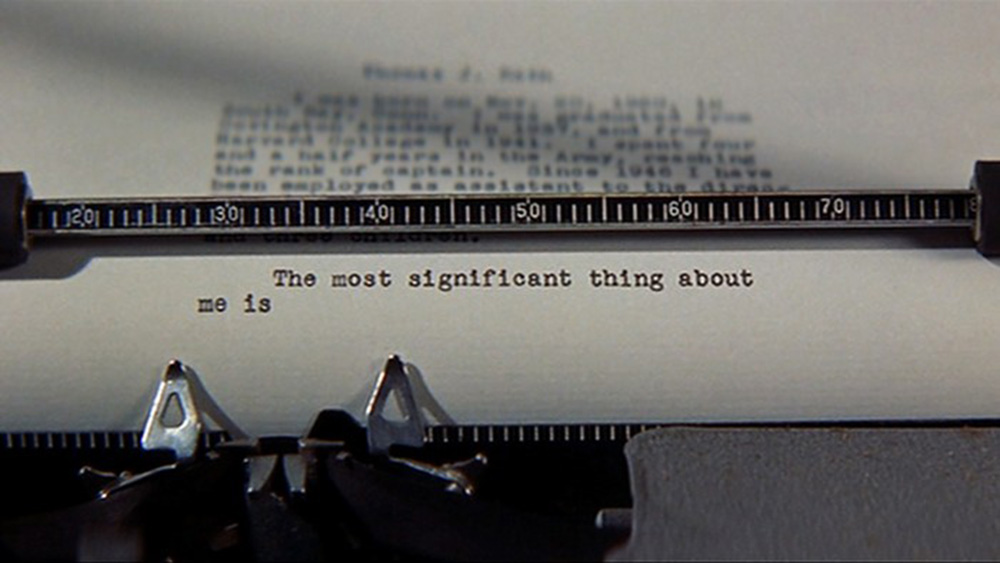
Christoph Girardet, Matthias MÜLLER
Personne
Experimental film | hdv | color and b&w | 15:4 | Germany | 2016
A broken bottleneck lies on the ground. An analogue telephone with a blank dial plate. The hero of the film, Jean-Louis Trintignant, in younger years – in older years. A man huddled on an elevator floor. Skewered butterflies. He is all alone in the world. The external is sealed off. The internal barricaded. He shifts between times. His focus is always trained on the other. Is he wanted, condemned, persecuted? The man whom we observe from the rear, is only able to see his back in the mirror. His face cannot be recognised. All the actions and movements, all the seeking and striving, all the alterations and associations revolve around the view and excerpt from “La reproduction interdite”, painted by Belgian surrealist René Magritte in 1937. The mirror axis of the film, and yet, and simply for that reason, one becomes the other. The other becomes many. “personne – that is somebody and nobody and anyone. That is us in the course of time. Persistently, in vain. The self is the need for permanent self-assertion”.
Christoph Girardet & Matthias Müller are directors, known for Cut (2013), Contre-jour (2009) and Personne (2016).
Fabien Giraud
Catalogue : 2006Thes Straight Edge | Experimental video | betaSP | color | 13:8 | France | 2005
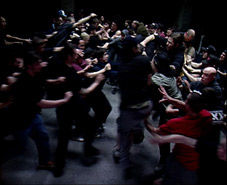
Fabien Giraud
Thes Straight Edge
Experimental video | betaSP | color | 13:8 | France | 2005
A crowd dances to the sound of a music that is not heard played by a band that is not seen. What is left is the sound of the bodies in movement, the image of a moving order. The Straight Edge is an experiment conducted in a concert of hardcore punk music. The crowd and its intensity provide the material. The shared expressions of joy, violence, and boredom are the elements of the cultural fiction at stake here. Within it, forms are tried, shifted, repeated. I approach community as a complex interplay in which individuals invent themselves. Sharing rules, postures, rhythms, each one constructs itself and creates a world. This movement of construction is at the heart of my work. I believe that it is always flexible, modifiable, that it can be altered and recreated. I believe in the fiction and the possibility of its reinvention.
Fabien Giraud, born in France in 1980, has studied at the Ecole Nationale Superieure des Arts Décoratifs in Paris and at the National Institute of Design in India. Presently living and working at Le Fresnoy, Studio National des Arts Contemporains in Tourcoing, France.
Helena Girón Vázquez, Samuel M. Delgado
Catalogue : 2026Un dragón de cien cabezas | Experimental doc. | 16mm | color | 14:50 | Spain | 2025
Helena GirÓn VÁzquez, Samuel M. Delgado
Un dragón de cien cabezas
Experimental doc. | 16mm | color | 14:50 | Spain | 2025
In the Garden of Hesperides, a fruit, capable of granting immortality to whoever ate it, once grew. This garden, located somewhere off the coast of West Africa, was guarded by a dragon with one hundred heads. Through the use of bio-sonification of banana trees, a monoculture crop in the Canary Islands, we discover a tale of eternal life where this mythical garden used to exist.
Their work investigates the relationship between mythology, history and materialism. Their first feature film, Eles transportan a morte (2021), premiered at the Venice and San Sebastian festivals winning awards at both. It has subsequently been shown at international festivals such as Rotterdam, Cairo, Mar del Plata, Viennale, Hamburg and Sao Paulo. Their short films have been shown at festivals like Toronto, Locarno, New York, Ann Arbor and many others. They have made installations and performances in art centers like CCCB (Barcelona), BAM (New York), TEA (Tenerife) or Solar (Vila do Conde).
Peter Gizzi, Natalia ALMADA
Catalogue : 2010Threshold Songs | Experimental film | super8 | color | 10:0 | Morocco | 2009
Peter Gizzi, Natalia ALMADA
Threshold Songs
Experimental film | super8 | color | 10:0 | Morocco | 2009
"Threshold Songs," by Natalia Almada and Peter Gizzi is part of "The Tangier 8," a film-poetry project that took place in Tangier, Morocco in June 2009. Working under tight time constraints-they had just four days to film, four days for sound, and four days for editing, the artists took inspiration from the city of Tangier-its history, architecture, people, politics, as well as from each other, to produce these short film-poems.
Natalia Almada- Born in 1974 in Mexico. She graduated with a Masters in Fine Arts in photography from the Rhode Island School of Design and shares her time between Mexico City and Brooklyn, New York. Her directing credits include All Water Has a Perfect Memory, an experimental short film; Al Otro Lado, her award winning debut feature documentary about immigration, drug trafficking and corrido music; and her most recent film, EL GENERAL, a family memoir and portrait of Mexico past and present which premiered at the 2009 Sundance Film Festival and won the best documentary director award. Her films have been shown at The Museum of Modern Art, The Guggenheim Museum, The Whitney Biennial, as well as at several film festivals around the world. She has received support for her work from numerous foundations including The Creative Capital Foundation, The Tribeca Film Institute, The Sundance Institute Documentary Film Program, PBS and others. Almada is a MacDowell Colony Fellow and a 2008 Guggenheim Fellow. 2) Peter Gizzi- Born in 1959 in Massachusetts. Gizzi attended Brown University, NYC and SUNY Buffalo. His books include The Outernationale (Wesleyan, 2007), Some Values of Landscape and Weather (Wesleyan, 2003), Artificial Heart (Burning Deck, 1998), and Periplum (Avec Books, 1992). In 2004 Salt Publishing of England reprinted an expanded edition of his first book as Periplum and other poems 1987-92. He has also published several limited-edition chapbooks, folios, and artist books. His work has been translated into numerous languages and anthologized here and abroad. His honors include the Lavan Younger Poet Award from the Academy of American Poets (1994) and fellowships in poetry from The Fund for Poetry (1993), The Rex Foundation (1993), Howard Foundation (1998), The Foundation for Contemporary Arts (1999), and The John Simon Guggenheim Memorial Foundation (2005).
Shaun Gladwell, -
Shaun Gladwell
Catalogue : 2006Storm Sequence | Art vidéo | dv | color | 5:37 | Australia | 2000
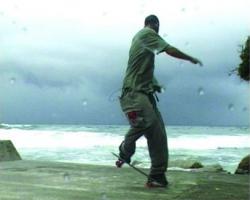
Shaun Gladwell
Storm Sequence
Art vidéo | dv | color | 5:37 | Australia | 2000
Gladwell is the calm in the storm. In slow motion we are able to grasp his skating ability - he was after all a champion skateboarder for Australia - as well as his ability to demonstrate the beauty in genuine and profound vulnerability. Gladwell was and continues to be fascinated with the slowing down of time and focusing on the beauty that exists in fleeting moments. In skateboarding culture, skaters will spend hours in front of a TV(or computer screen) playing footage in slow motion to learn and later execute various skateboarding techniques. Unsuspecting viewers are introduced to a standard practice of a particular subculture and offered the opportunity to cast a fresh eye over an ?other?. In the Silent, Ambient and Harder Remixes exhibition catalogue essay, Simon Rees rightly states the artist is wearing Turner-esque shaded clothes that are various shades of grey, which includes the heavy silver chain that sways back and forth with his every move. Not only does this work document contemporary skateboard fashion but it complements the stormy and sombre landscape in the background. Storm Sequence was dedicated to the artist?s skateboard trainer and close friend who died in the late 90?s, hence the interpretation of genuine and profound vulnerability. There is a great sadness that underlies this fabulous piece, yet it is peaceful and meditative. Gladwell is an intelligent, well read artist, interested in theories questioning the notion of public and private spaces and notions of the ?other? and this particular case, the ?sub?. Storm Sequence, made in 2000, is one of a four part series comprised of; Storm Sequence, Kick flipping Flaneur, Tangara and Double Line Work. The work was commissioned by Peter Fay and has been the focus of many exhibitions in Sydney, Canberra, Perth, Beirut, New York and London.
SHAUN GLADWELL Born 1972, Western Sydney Shaun Gladwell completed a bachelor of Visual Art (Hons) at the University of Sydney in 1996, followed by a Masters of Visual Art at the College of Fine Arts, University of New South Wales. In 2001, he was awarded a three-month Australia Council residency at the Cité International Des Arts, Paris. An Anne and Gordon Samstag International Scholarship enabled him to undertake associate research at Goldsmiths College, London (2001?02). During this time, he was included in the show, The Mind is a Horse, at Bloomberg Space, London. In 2002, Gladwell was commissioned to present a broadcast work for Netherlands TV network 4DTV and was included in Iain Borden?s first theoretical survey on skateboarding culture. Recent solo exhibitions include New Balance at Perth Institute of Contemporary Art (2004) and two Sherman Galleries? exhibitions, Silent, Ambient and Harder Remixes (2003) and MMXBREAKLESS SESSIONS (2005). Shaun Gladwell has been represented in important national and international group exhibitions, including Primavera 2003: Exhibition of Young Australian Artists, Museum of Contemporary Art, Sydney; 2004: Australian Culture Now, Australian Centre for the Moving Image (ACMI) and The Ian Potter Centre: NGV Australia, Melbourne; and, in 2005, the Anne Landa Art Award, Art Gallery of New South Wales, Sydney; Not Worried: New Art From Australia, Raid Projects, Los Angeles; New Acquisitions, Govett-Brewster Art Gallery, New Plymouth, NZ; and Space Invaders, Museum Kunsthaus Baselland, Basel, Switzerland. Shaun Gladwell is represented by Sherman Galleries, Sydney.
Alexander Glandien
Catalogue : 2016Making of | Experimental doc. | hdv | color | 30:0 | Germany, Austria | 2015
Alexander Glandien
Making of
Experimental doc. | hdv | color | 30:0 | Germany, Austria | 2015
The film "Making of" takes work as a topic into focus, showing the various working areas of a contemporary art museum with all those activities which usually remain invisible for visitors. Shot from the perspective of a small filmcrew different kind of workflows are documented as well as the preparation for an upcoming exhibition, while the crew itself is constantly observed in their efforts to create this film. Director, cameraman and sound operator move through all areas of the The State Gallery in Linz in an almost performative way. The ongoing visible presence of the camera raises questions about the relationship between the documented actions, their authenticity and manipulation. The depicted reality becomes visible as part of a media construction.
Alexander Glandien was born in 1982 in Schwerin (Germany) and he works as an artist in Vienna. Since 2009 he is artistic and scientific assistant at the Art University Linz. After his studies at the University of Wismar he attended studio grants in Indonesia, Italy, the Netherlands and Spain. His works have been awarded with the Talent Award of Upper Austriaand the Klemens Brosch prize and they are part oft the art collections of the federal government of Austria, the province of Upper Austria, the contemporary art collection of the City of Vienna and the Albertina in Vienna. He has had numerous exhibitions, most recently at the State Gallery Linz, Galerie 5020 in Salzburg, at Kadmium Art Centre in Delft, at the Moscow Museum of Modern Art and at the Albuquerque Museum of Art and History.